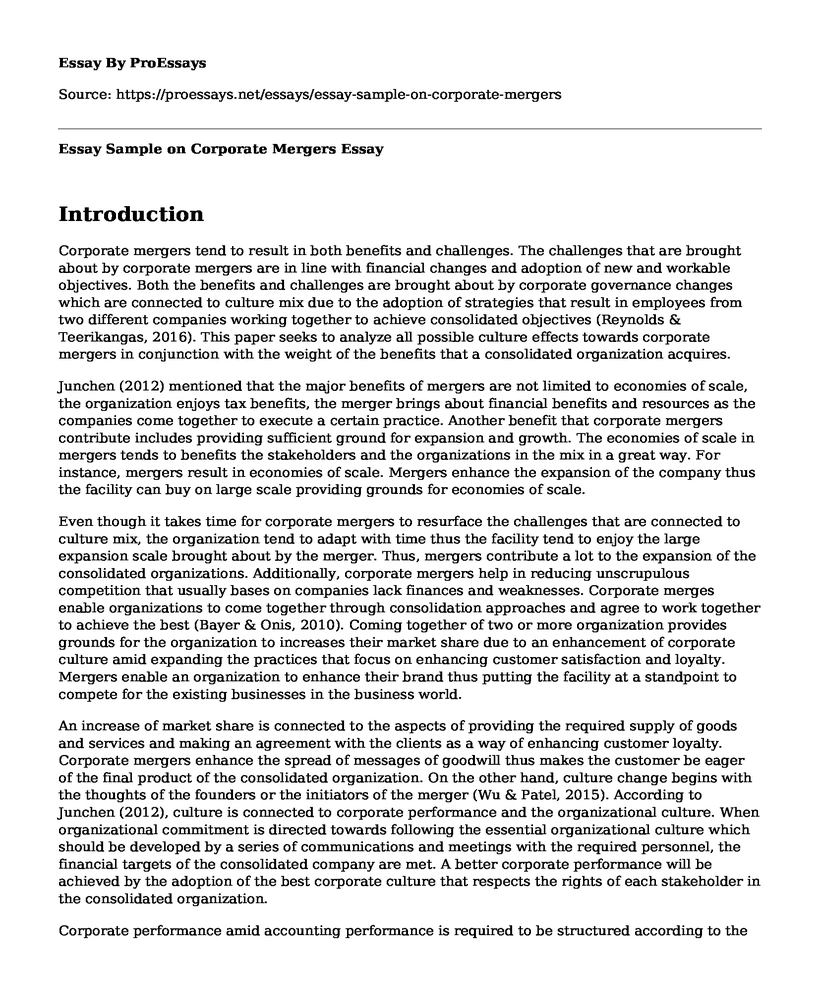Introduction
Corporate mergers tend to result in both benefits and challenges. The challenges that are brought about by corporate mergers are in line with financial changes and adoption of new and workable objectives. Both the benefits and challenges are brought about by corporate governance changes which are connected to culture mix due to the adoption of strategies that result in employees from two different companies working together to achieve consolidated objectives (Reynolds & Teerikangas, 2016). This paper seeks to analyze all possible culture effects towards corporate mergers in conjunction with the weight of the benefits that a consolidated organization acquires.
Junchen (2012) mentioned that the major benefits of mergers are not limited to economies of scale, the organization enjoys tax benefits, the merger brings about financial benefits and resources as the companies come together to execute a certain practice. Another benefit that corporate mergers contribute includes providing sufficient ground for expansion and growth. The economies of scale in mergers tends to benefits the stakeholders and the organizations in the mix in a great way. For instance, mergers result in economies of scale. Mergers enhance the expansion of the company thus the facility can buy on large scale providing grounds for economies of scale.
Even though it takes time for corporate mergers to resurface the challenges that are connected to culture mix, the organization tend to adapt with time thus the facility tend to enjoy the large expansion scale brought about by the merger. Thus, mergers contribute a lot to the expansion of the consolidated organizations. Additionally, corporate mergers help in reducing unscrupulous competition that usually bases on companies lack finances and weaknesses. Corporate merges enable organizations to come together through consolidation approaches and agree to work together to achieve the best (Bayer & Onis, 2010). Coming together of two or more organization provides grounds for the organization to increases their market share due to an enhancement of corporate culture amid expanding the practices that focus on enhancing customer satisfaction and loyalty. Mergers enable an organization to enhance their brand thus putting the facility at a standpoint to compete for the existing businesses in the business world.
An increase of market share is connected to the aspects of providing the required supply of goods and services and making an agreement with the clients as a way of enhancing customer loyalty. Corporate mergers enhance the spread of messages of goodwill thus makes the customer be eager of the final product of the consolidated organization. On the other hand, culture change begins with the thoughts of the founders or the initiators of the merger (Wu & Patel, 2015). According to Junchen (2012), culture is connected to corporate performance and the organizational culture. When organizational commitment is directed towards following the essential organizational culture which should be developed by a series of communications and meetings with the required personnel, the financial targets of the consolidated company are met. A better corporate performance will be achieved by the adoption of the best corporate culture that respects the rights of each stakeholder in the consolidated organization.
Corporate performance amid accounting performance is required to be structured according to the newly adopted corporate culture that is mindful of both cultures in the new company due to consolidation. Even though mergers are connected to various advantages, there are less shared values thus it requires the organization to start up a program that should enable the two cultures to start up an association that should enhance better organizational culture. Adaptation and internal integration are geared towards strengthening the challenges of lack of shared culture. For that matter, Junchen (2012) outlines the need for proper induction to start up a program for enhancing the initiation of the few Turkish employees to the new consolidated organization.
References
Bayer, R., & Onis, Z. (2010). Turkish Big Business in the Age of Democratic Consolidation: The Nature and Limits of its Influence. South European Society and Politics, 15(2), 181-201.
Junchen, H. (2012). A Literature Review on Organization Culture and Corporate Performance. School of Management, Fudan University. Shanghai, China. doi:10.5430/ ijba. v3n2 p28.
Reynolds (nee Schnurr), N., & Teerikangas, S. (2016). The international experience in domestic mergers - Are purely domestic M&A a myth. International Business Review, 25(Part A), 42-50. doi: 10.1016/j.ibusrev.2015.07.002
Cite this page
Essay Sample on Corporate Mergers. (2022, Jun 26). Retrieved from https://proessays.net/essays/essay-sample-on-corporate-mergers
If you are the original author of this essay and no longer wish to have it published on the ProEssays website, please click below to request its removal:
- Contemporary and International Issues in Business Ethics
- Legal Protection for the Individual Employee Paper Example
- Wild Planet: The Entrepreneurial Spirit
- Paper Example on Exploring Hyatt Hotels Geneva Strategy
- Essay Example on IKEA Facing Human Rights Complaint at The Hague
- Essay Example on Jones' Dam Project Success Threatened by Corruption
- The Virtual Reality Museum - Report Example







